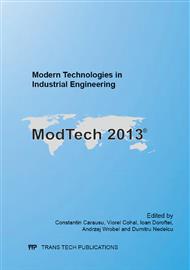p.71
p.77
p.84
p.88
p.93
p.99
p.105
p.110
p.116
Influence of Tool - Semi-Product Friction on the Force Evolution at the Simulation of the Deformation Process with Flat Wedge Tools
Abstract:
Processing through volumetric cold plastic deformation (cold rolling) with flat wedge tools is a procedure used in mass production to process profiles (circular, threads, grooves, teeth) on revolution pieces. Complex profiles obtained by cold plastic deformation with flat wedge tools have important advantages: material economy, high productivity, continuous fibre, superior mechanic properties, low values of the roughness parameters, low costs. In recent years, the simulation of processes of volumetric plastic deformation by the finite element method is used to obtain the optimization of the deformation process and the improvement of the product quality even from the design stage. By numerical simulation there is observed the evolution during the process of different parameters such as: stress and deformations in the deformed body, mode of material flow, final shape and sizes of the product etc. Therefore, it becomes possible to analyse the process even from the design stage by identifying the problems which can appear and their influence on some characteristics of the product obtained: geometry, state of deformations and stress.This paper presents the experimental determination of the deformation force at the processing of complex profiles with flat wedge tools and the influence of the friction coefficient between tool and semi-product on its value; influence established by simulating the deformation process. The process also has been simulated by means of finite element calculations using the Abaqus/Explicit code. The material behaviour is described by using a 5-parameter strain-hardening law and by accounting for thermal effects at high strain-rates. The comparison between the values and the variation of the deformation force recorded experimentally and at simulation allows establishing the optimal value of the friction coefficient and validating the numerical model developed.
Info:
Periodical:
Pages:
93-98
DOI:
Citation:
Online since:
November 2013
Price:
Сopyright:
© 2014 Trans Tech Publications Ltd. All Rights Reserved
Share:
Citation:


